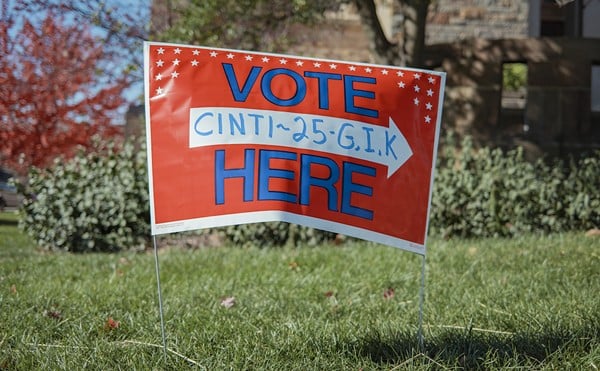The repeal of Article 12 of the Cincinnati City Charter, frequently referred to as "the anti-gay law," made it clear that Cincinnatians want to end discrimination based on sexual orientation, according to Councilman David Crowley. He, Vice Mayor Jim Tarbell and council members Laketa Cole and Chris Bortz announced March 7 they'll propose an ordinance to forbid it.
"With this proposal, I can now welcome my two gay children to Cincinnati knowing that they, like all Cincinnatians, will be protected," Crowley said.
The proposal, which would amend the city's Human Rights Ordinance, defines sexual orientation as "an individual's actual or perceived heterosexuality, homosexuality, bisexuality or transgendered status, by orientation or practice" and includes a detailed description of "transgendered." Cole said she's co-sponsoring the ordinance because, as an African-American and a woman, she's experienced discrimination firsthand and she wants to eliminate it from jobs, housing and other areas.
"For too long we have been a city that sometimes closes its doors on people, and it's time for us, if we really want to get the gear shift out of neutral and put it into drive, it's time for us to do this," she said. "We need to be less worried about who people are sleeping with and focus on where our city is going."
Expecting a backlash from homophobes, Crowley said the obvious support from businesses with their own inclusion policies and support for the repeal of Article 12 makes it clear that the proposal will enjoy widespread support. The ordinance will be introduced Tuesday to the Law and Public Safety Committee for public comment.
The backlash came quickly at WAIF (88.3 FM) following a report on programmers' objection to video cameras in the studio (see "Watching at WAIF," issue of Feb. 22-28).
Derrick Blassingame says he was ousted from the station's board of trustees last week, suspected of being an anonymous source for the article. He says the charge of "conduct unbecoming a member" involved "false and ridiculous allegations."
"Amongst them was my being accused of 'tipping the CityBeat article' and providing your paper with information," he says. "(WAIF Board President) Donald Shabazz stated in the article that no one will be terminated for speaking out against the cameras. But on March 1, I was removed from the board, my program terminated and banned from the station."
Blasingame recorded a conversation with Howard Riley, station manager, about Riley's removing copies of CityBeat from the WAIF lobby.
"They were talking bad about us," Riley said. "Why would I want to let them spread those stories about us?"
Great Literature and Bland City Reports
After taking up marijuana legislation proposed by then-Councilman David Pepper, which didn't make it out of committee in 2005, Councilman Cecil Thomas seems unable to come up with proof that it's good public policy or that residents want it. In an attempt to build support for his proposal, which would create jail sentences for possession of any amount of pot, Thomas last week invited Tamara Madensen of the University of Cincinnati Criminal Justice Division to address the Law and Public Safety Committee.
Madensen discussed a study, originally requested by Pepper, on crime "hot spots." Open-air drug markets were identified as the source of most crime and studied for seven months in five neighborhoods. After qualifying the data as limited and cautioning council that more extensive study is needed before drawing conclusions, Madensen said a "comprehensive approach" is essential to reducing crime.
That's hardly an endorsement, but at least it was more thoughtful than a report by Police Chief Thomas Streicher — nothing more than a listing of the number of drug-related police responses and Tristate marijuana laws. Streicher provided no data or evidence that a new ordinance would reduce marijuana trafficking.
"The enactment of a city ordinance elevating the penalty for the possession of 100 grams of marijuana or less would mirror current legislation in Kentucky and Indiana for small amounts of marijuana," Streicher wrote.
The benefits? He didn't say.
Who says Shakespeare isn't relevant? Harvard University literary scholar Stephen Greenblatt spoke Feb. 28 at the Mercantile Library about "Ethics of Authority and Power in Shakespeare." The author of the best-selling Shakespeare biography, Will in the World, focused on Macbeth and King Lear but had more recent political leaders in mind.
He shared an anecdote about meeting President Clinton at the White House in 1995, early in the Lewinsky scandal. Clinton mentioned memorizing speeches from Macbeth in junior high school. Afterwards, shaking Clinton's hand in a receiving line, Greenblatt asked, "Don't you think it's a play about someone compelled to do the morally disastrous?" Without missing a beat, Clinton replied, "No, it's a play about someone whose immense ambition has an ethically inadequate object." Greenblatt concluded that Clinton, who then recited the "Tomorrow and tomorrow and tomorrow" soliloquy, missed his true calling as an English professor.
Greenblatt's analysis of several rulers from Shakespeare's plays never included overt analogy to contemporary leaders, but no one missed the subtle relevance regarding how each of them lacked an ethical compass and met a tragic end because of an overt desire for power without conscience.
Porkopolis TIP LINES: 513-665-4700 (ext. 138) or pork(at)citybeat.com





